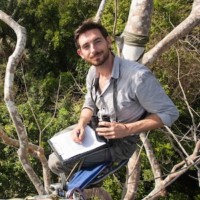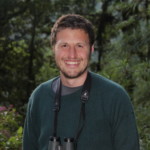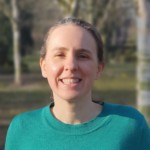Meet . . . our Grants Committee
Dr Sonya Clegg
Chair
Sonya is Associate Professor of Evolutionary Ecology at the Department of Zoology, University of Oxford. Her research focuses on unravelling the evolutionary processes that promote divergence in wild vertebrate systems. She uses a variety of methodologies to answer questions about genomic, morphological, ecological and behavioural differentiation, including the role of natural selection and the ecological and evolutionary importance of disease in bird communities. Sonya’s primary research systems are island colonising birds of south-west Pacific islands, and she runs a long-term study of silvereyes on Heron Island, Australia.
Dr Tom Bradfer-Lawrence
 Tom is a Senior Conservation Scientist at the RSPB, where his work includes ecoacoustics, community ecology, and nature-based solutions to climate change. He undertook his PhD at the University of Stirling, studying the bird community of a human-modified landscape in the Republic of Panama. Prior to this, Tom worked in the conservation sector for many years, both in Scotland and overseas. Although he has studied a range of taxa, the overarching theme has been one of seeking opportunities to balance human needs with wildlife conservation.
Tom is a Senior Conservation Scientist at the RSPB, where his work includes ecoacoustics, community ecology, and nature-based solutions to climate change. He undertook his PhD at the University of Stirling, studying the bird community of a human-modified landscape in the Republic of Panama. Prior to this, Tom worked in the conservation sector for many years, both in Scotland and overseas. Although he has studied a range of taxa, the overarching theme has been one of seeking opportunities to balance human needs with wildlife conservation.
Dr Davide Dominoni
 Davide is Lecturer in Urban Ecology at the University of Glasgow. He studied in Italy and then held research positions in Italy, Germany, Australia and the Netherlands. Davide’s research seeks to uncover the strategies that birds adopt to cope with global environmental changes. A particular focus of his group is the effects of the increasing worldwide urbanisation. He published landmark studies on the effects of light pollution on biological rhythms of passerines. His work spans different levels of biological organisation, from genes to behaviour, to populations and communities. He runs a long-term study on blue tits along a 35-mile urban gradient in Glasgow. His ultimate drive is to understand how we can plan and build more sustainable cities to ensure the wellbeing of wildlife and humans alike. To this end, he collaborates extensively with researchers, field ornithologists (including ringers), NGOs and policy makers.
Davide is Lecturer in Urban Ecology at the University of Glasgow. He studied in Italy and then held research positions in Italy, Germany, Australia and the Netherlands. Davide’s research seeks to uncover the strategies that birds adopt to cope with global environmental changes. A particular focus of his group is the effects of the increasing worldwide urbanisation. He published landmark studies on the effects of light pollution on biological rhythms of passerines. His work spans different levels of biological organisation, from genes to behaviour, to populations and communities. He runs a long-term study on blue tits along a 35-mile urban gradient in Glasgow. His ultimate drive is to understand how we can plan and build more sustainable cities to ensure the wellbeing of wildlife and humans alike. To this end, he collaborates extensively with researchers, field ornithologists (including ringers), NGOs and policy makers.
Ros Green (role-sharing)
 Ros is an applied and field scientist currently undertaking a part-time PhD at the University of Liverpool, whilst also continuing her work as a Research Ecologist at the British Trust for Ornithology (BTO). She’s been a professional field ornithologist since 2014, surveying, monitoring, ringing, GPS tagging and analysing data for seabirds, waders, ducks and passerines. She’s also worked within the Ringing Licensing Team at BTO. She’s a ringing trainer and cannon-net license holder, and has conducted research in the UK, Australia, New Zealand and USA. Her main research interests are around the effects of anthropogenic habitat change and trophic level imbalance on K-selected avian species. She loves working collaboratively in dynamic teams to further our understanding of the world around us.
Ros is an applied and field scientist currently undertaking a part-time PhD at the University of Liverpool, whilst also continuing her work as a Research Ecologist at the British Trust for Ornithology (BTO). She’s been a professional field ornithologist since 2014, surveying, monitoring, ringing, GPS tagging and analysing data for seabirds, waders, ducks and passerines. She’s also worked within the Ringing Licensing Team at BTO. She’s a ringing trainer and cannon-net license holder, and has conducted research in the UK, Australia, New Zealand and USA. Her main research interests are around the effects of anthropogenic habitat change and trophic level imbalance on K-selected avian species. She loves working collaboratively in dynamic teams to further our understanding of the world around us.
Dr Sam Patrick (role-sharing)

Dr Martin Sullivan
 Martin is a Senior Lecturer in Statistical Ecology at Manchester Metropolitan University whose research focuses on understanding how species and ecosystems respond to environmental change. His PhD at the University of East Anglia investigated how to predict the potential distribution and impacts of non-native bird species. After this, he worked for the British Trust for Ornithology before starting a postdoc at the University of Leeds studying how tropical forests respond to global change and the role of biodiversity in influencing this. Working on pantropical patterns in forest dynamics is only possible thanks to many collaborators around the world, and Martin contributes to the ongoing development of the ForestPlots.net database which provides a platform for hosting and equitably sharing forest inventory plot data. Tropical forests continue to be the main focus of Martin’s work, and he currently is working on research projects in Sierra Leone and Rwanda.
Martin is a Senior Lecturer in Statistical Ecology at Manchester Metropolitan University whose research focuses on understanding how species and ecosystems respond to environmental change. His PhD at the University of East Anglia investigated how to predict the potential distribution and impacts of non-native bird species. After this, he worked for the British Trust for Ornithology before starting a postdoc at the University of Leeds studying how tropical forests respond to global change and the role of biodiversity in influencing this. Working on pantropical patterns in forest dynamics is only possible thanks to many collaborators around the world, and Martin contributes to the ongoing development of the ForestPlots.net database which provides a platform for hosting and equitably sharing forest inventory plot data. Tropical forests continue to be the main focus of Martin’s work, and he currently is working on research projects in Sierra Leone and Rwanda.
Dr Leila Walker
Chief Operations Officer
Leila has responsibility for the day to day management and running of the BOU including conferences and events, the business side of the BOU’s journal, IBIS, social media and communications, website development and content management and servicing BOU Council and its Standing Committees.


